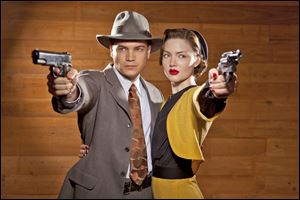
TV
'Bonnie & Clyde' miniseries is harsher than ’67 film
12/9/2013
Emile Hirsch and Holliday Grainger star in the all-new miniseries ‘Bonnie & Clyde’.
A new production of Bonnie & Clyde is really more about Bonnie, a Depression-era woman who in this interpretation takes to a life of crime in order to star in a production worthy of Hollywood.
It is a grubbier and grimmer take on the tale of the two desperadoes than the 1967 movie starring Warren Beatty and Faye Dunaway, and one that is harsher about its stars and more clear-eyed about their criminality. It is also expected to draw sizable audiences, since it will air on three cable networks — A&E, History, and Lifetime. The first part aired Sunday at 9 p.m., but if you missed it, an encore presentation of Part One will air tonight at 7 p.m., with the conclusion following at 9.
Beginning before the couple starts their shooting spree, it depicts Clyde Barrow (Emile Hirsch, Into the Wild) as a ne’er-do-well turned into a sullen low-life, particularly after he was abused and beaten during a prison stint. Bonnie Parker (Holliday Grainger, The Borgias) is less murderous but no less eager to get out of her dreary life. In Clyde she not only sees romance but a chance for headlines and fame in an era when outlaws achieved both. As the promos for the four-hour production say, “He held the gun. She called the shots.”
Of course, eventually they would both be shot — ambushed by a crew led by aging Texas Ranger Frank Hamer, played here by William Hurt. (Movie fans will note that this production finds him again sharing screen time with his Broadcast News co-star Holly Hunter, who plays Bonnie’s mother.) Hamer is just one of many lawmen pursuing the couple as their notoriety grows and bloodshed increases. There’s a constant sense in this version, written by John Rice and Joe Batteer and directed by Bruce Beresford, that time is not on Bonnie and Clyde’s side. He is beset by fatal visions of the future. She does not always see clearly the horror they are causing, preferring instead to focus on her celebrity.
Their heyday was only two years long; Clyde was 25 and Bonnie 24 when they died. In casting Hirsch and Grainger, the production emphasizes its main characters’ youth more than the 1967 film. It also tries to be clear that their glamour was largely media-created; neither had the movie-star looks of Beatty and Dunaway. The violence is considerable, and there is a starkly sexual scene that has nothing to do with romance.
Still, the production is not bad, at least when Grainger is the focus. After all, by most accounts I have read, Clyde was a sourpuss even when he wasn’t killing people, and Hirsch holds that note in his performance. Grainger is quite good as the grasping Bonnie, conveying not only her lack of a moral center but her astounding naivete. Fame is all that matters to Bonnie, no matter how many bodies it piles up.